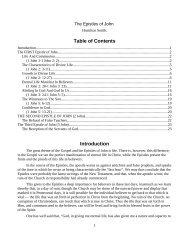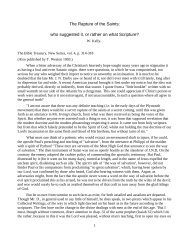An Exposition of Revelation .pdf
An Exposition of Revelation .pdf
An Exposition of Revelation .pdf
Create successful ePaper yourself
Turn your PDF publications into a flip-book with our unique Google optimized e-Paper software.
generate neutrality than an outwardly true position, if self-judgment be not maintained with godly<br />
sincerity. The more one stands in the forefront <strong>of</strong> the battle, with the responsible testimony <strong>of</strong> God, the<br />
more His grace and truth are in letter brought out before others, if there be not also walk according to<br />
the light, sooner or later comes a lapse back into neutrality, if not active enmity. For heart and<br />
conscience are not animated and governed by the power <strong>of</strong> God's Spirit through living faith in Christ.<br />
Indifference to all that is good must follow; and the only kind <strong>of</strong> zeal, if zeal can so exist, will be for<br />
what is <strong>of</strong> the first man, worldly, and bad.<br />
This is Laodiceanism. So repulsive does the Master declare it to be, that one need not wonder<br />
that most are unwilling for it to be their lot, or that it can be, as it is, the last recorded phase before the<br />
church is traced no more on earth. People vainly dream <strong>of</strong> progress, and flatter themselves. "Thus<br />
because thou art neither cold nor hot, I am about to spue thee out <strong>of</strong> my mouth. Because thou sayest, I<br />
am rich, and am grown rich, and have need <strong>of</strong> nothing, and knowest not that thou art the wretched one<br />
and the miserable, and poor, and blind, and naked; I counsel thee to buy <strong>of</strong> me gold purified by fire."<br />
They wanted everything that was characteristic <strong>of</strong> Christianity: "gold" or divine righteousness in<br />
Christ, "that thou mayest be rich"; "and white garments," or the righteousnesses <strong>of</strong> saints, "that thou<br />
mayest be clothed, and that the shame <strong>of</strong> thy nakedness may not be manifested; and eyesalve to anoint<br />
shine eyes, that thou mayest see." They had lost the perception <strong>of</strong> what God values. All was dark as to<br />
truth, and uncertain as to moral judgment. Holy separateness and savour were gone. "As many as I<br />
dearly love, I rebuke and chasten: be zealous therefore, and repent. Behold, I stand at the door and am<br />
knocking: if any one hear my voice, and open the door, I will come in to him, and will sup with him,<br />
and he with me." The Lord presents Himself even there in His pitiful way to meet their every want<br />
"He that overcometh, I will give him to sit down with me in my throne, as I also overcame and<br />
sat down with my Father in his throne. He that hath an ear, let him hear what the Spirit saith to the<br />
churches."<br />
The utmost promised in the word that closes the epistle goes not beyond reigning with Him. It is<br />
not anything special. For every one that has part in the first resurrection reigns with Christ, as even<br />
shall the Jewish sufferers under earlier enemies, or later under the Beast. It is a mistake therefore to<br />
suppose that it is a singular distinction. For all amounts to this, that the Lord will hold, after all, to His<br />
own truth in spite <strong>of</strong> unfaithfulness. There may be individual reality, even where the surroundings are<br />
miserably untoward. But all that are born <strong>of</strong> God and are Christ's share the kingdom.<br />
Such is the bearing <strong>of</strong> the seven churches to which the Lord was pleased to send the letters<br />
contained in the second and third chapters. We have found substantial reason and ample evidence in<br />
their own contents, as well as in the character <strong>of</strong> the book itself, to look for a meaning far more<br />
comprehensive than only the historical notice <strong>of</strong> the Asiatic churches then primarily addressed. That<br />
John wrote to these seven churches is indisputable; but that no more was meant ought not to be<br />
assumed. "The things that are" is an unusual and suggestive expression. The septenary number in itself<br />
is significant, and its division into three and four. Again, the order <strong>of</strong> their contents, as well as their<br />
nature severally, points to a continuative inference. There are depicted successive phases <strong>of</strong> strikingly<br />
varied ecclesiastical states, as objects <strong>of</strong> the Lord's judgment from the threat on the first till the spuing<br />
out <strong>of</strong> the last. Further it is plain, if certain phases do not abide, that at a given point in their course the<br />
language implies that the latter ones continue up to Christ's coming. From Thyatira inclusively those<br />
also that follow, as they successively arise, go on together till then.<br />
Thus one gathers from the internal evidence that the three earlier churches are severed in<br />
character from the rest; for though all are alike typical and successive from the apostle's day, only the<br />
26






